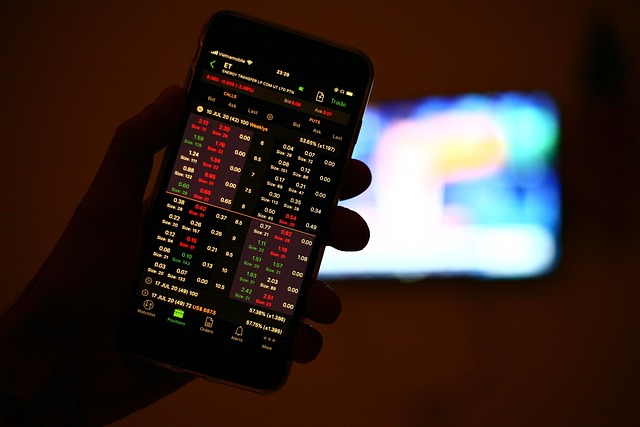What Trading App Is Real: A Comprehensive Guide to Identifying Legitimate Platforms
Author: Jameson Richman Expert
Published On: 2025-09-14
Prepared by Jameson Richman and our team of experts with over a decade of experience in cryptocurrency and digital asset analysis. Learn more about us.
In today's rapidly evolving digital economy, online trading platforms have revolutionized the way individual investors access and participate in global financial markets. These platforms facilitate trading in a diverse array of assets including cryptocurrencies, stocks, foreign exchange (forex), commodities, options, and derivatives—all from the comfort of a smartphone or computer. This democratization of trading offers unprecedented opportunities for wealth-building and diversification; however, it simultaneously exposes traders to significant risks. The proliferation of unregulated and fraudulent trading apps poses threats to your funds, personal data, and overall financial security. Therefore, accurately identifying legitimate, trustworthy platforms is crucial for a secure and compliant trading experience. This comprehensive guide delves deep into the key features that distinguish reputable trading apps, provides detailed analyses of some of the most credible platforms, and offers practical strategies to navigate this complex landscape with confidence.

Understanding What Defines a Trustworthy Trading App
The primary criterion for evaluating any trading platform is its regulatory status. Regulatory oversight by recognized financial authorities acts as a critical safeguard, ensuring the platform operates transparently, adheres to legal standards, and provides mechanisms for dispute resolution. Regulatory agencies enforce strict requirements such as adequate capitalization, segregation of client funds, regular independent audits, and comprehensive AML (Anti-Money Laundering) and KYC (Know Your Customer) procedures. These measures are designed to prevent fraud, insolvency, and malpractices, thereby safeguarding traders’ interests and fostering market integrity.
Regulatory bodies worldwide that oversee legitimate trading platforms include:
- United States: Securities and Exchange Commission (SEC), Commodity Futures Trading Commission (CFTC)
- United Kingdom: Financial Conduct Authority (FCA)
- European Union: European Securities and Markets Authority (ESMA)
- Singapore: Monetary Authority of Singapore (MAS)
- Australia: Australian Securities and Investments Commission (ASIC)
- Canada: Investment Industry Regulatory Organization of Canada (IIROC)
Always verify the licensing credentials of a trading app through official regulatory websites. These credentials are usually displayed prominently on the platform’s website, often in the footer or 'About' section. Cross-verification with the regulator’s official portal confirms legitimacy and prevents falling victim to scams. Platforms that lack proper regulation, or those that obscure or falsify regulatory status, should be approached with extreme caution, as they are more likely to be involved in fraudulent activities or insolvency schemes.
Additional Indicators of Authenticity and Reliability
- Transparency of Operations: Reputable platforms openly disclose key information such as their physical headquarters, legal structure, fee schedules, and detailed terms of service. Transparency extends to clear explanations of trading conditions, margin requirements, and risk disclosures, empowering traders to make informed decisions.
- Data Security and Privacy: Leading trading apps implement high-standard security measures, including SSL encryption (HTTPS), robust privacy policies, and regular security audits. Features such as two-factor authentication (2FA), biometric login options, and biometric authentication enhance account security and protect sensitive data from unauthorized access.
- User Feedback and Community Reputation: Genuine platform performance can often be gauged through reviews and feedback on reputable sites like Trustpilot, Reddit, ForexPeaceArmy, and industry-specific forums. While individual experiences vary, consistent reports of withdrawal difficulties, poor customer support, or platform outages should raise red flags.
- Advanced Security Protocols: Trusted platforms employ multi-layered security measures including cold storage solutions for cryptocurrencies, multi-signature wallets, regular penetration testing, and routine security assessments. These protocols help mitigate hacking risks and asset theft.
- Educational Resources and Customer Support: Top-tier trading apps invest heavily in trader education by providing tutorials, webinars, demo accounts, and comprehensive knowledge bases. Responsive customer service via multiple channels—live chat, email, phone—also significantly enhances user trust and operational resilience.
In-Depth Analysis of Prominent and Trusted Trading Platforms
When selecting a trading platform, it’s essential to evaluate multiple factors beyond regulation alone. Consider liquidity, trading tools, platform stability, user experience, and community reputation. Accessing these platforms through official and verified channels minimizes scam risks and ensures adherence to compliance standards. Many leading platforms also offer bonuses, promotional incentives, and demo accounts, which can be beneficial for new traders seeking to build confidence and familiarity with the platform.
Binance
As one of the world’s largest cryptocurrency exchanges, Binance boasts an extensive ecosystem for digital asset trading. Its offerings include spot trading, futures, options, staking, savings products, and decentralized finance (DeFi) services. Binance operates under multiple licenses depending on jurisdiction and has implemented robust security measures such as the SAFU (Secure Asset Fund for Users), which insures user funds against hacking incidents. The platform enforces rigorous KYC procedures to prevent fraud and money laundering. With high liquidity, advanced trading tools, and a user-friendly interface suitable for both beginners and experienced traders, Binance remains a top choice. Always access Binance through the official link: here.
MEXC
MEXC is renowned for its broad selection of cryptocurrencies, derivatives, and spot trading options. It offers high liquidity, fast execution speeds, and a multitude of trading pairs, making it appealing to a wide spectrum of traders—from novices to professionals. The platform emphasizes security via features like cold storage, multi-signature wallets, continuous security audits, and strict KYC protocols. MEXC also provides educational resources and fosters an active community environment. Access the platform via this registration page.
BitGet
BitGet has gained popularity for its social trading features, including copy trading and high-leverage derivatives. Its transparency and security are underscored by operating under multiple regulatory jurisdictions. BitGet employs advanced encryption, AML/KYC protocols, and multi-layered security systems to protect assets and user data. Additionally, the platform offers educational materials and responsive customer support, making it suitable for traders of all experience levels. Register through this link.
Bybit
Specializing in derivatives, margin trading, and risk mitigation tools, Bybit offers features like insurance funds, auto-deleveraging, and comprehensive risk controls. It holds regulatory approvals in key markets such as the UK, Japan, and the UAE. Bybit’s security infrastructure includes multi-layered encryption, cold wallets, and regular audits. Its intuitive user interface and responsive support team make it a preferred choice for professional traders. Sign up via this official link.

Critical Factors to Consider When Selecting a Trading App
- Regulatory Compliance: Always verify the licensing and oversight of the platform with official authorities. Non-regulated platforms lack oversight and pose substantial risks to your assets and data security.
- Security Protocols: Confirm the platform employs advanced security features such as two-factor authentication, SSL encryption, segregated client accounts, cold storage solutions, and routine security audits.
- Platform Stability and Performance: Look for high uptime, low latency, and reliable order execution, particularly vital during volatile market conditions.
- User Interface and Experience: An intuitive, straightforward interface minimizes errors and enhances efficiency, especially important for beginner traders.
- Customer Support and Resources: Reliable support channels, educational content, and demo accounts help traders learn and resolve issues quickly, reducing operational risks.
- Fee Structure and Transparency: Be aware of all trading fees, withdrawal charges, and potential hidden costs. Transparent, well-communicated fee structures are hallmarks of reputable platforms.
Additional Tips for Ensuring Safe and Secure Trading
- Start trading with small amounts initially to evaluate platform reliability and features before scaling your investments.
- Use strong, unique passwords and enable two-factor authentication (2FA) on your trading accounts.
- Keep your device software and trading apps updated to mitigate security vulnerabilities.
- Utilize reputable VPN services when accessing trading platforms over public or unsecured Wi-Fi networks.
- Stay informed through industry news, regulatory updates, and alerts from trusted sources like CoinDesk, CoinTelegraph, and official platform blogs.
- Be wary of platforms promising guaranteed returns or extraordinary profits—they are often scams or Ponzi schemes.
Final Thoughts
Choosing a legitimate trading app forms the foundation of a safe, profitable trading journey. Prioritize platforms with clear regulatory oversight, robust security features, transparency, and positive community reputation. Leading platforms like Binance, MEXC, BitGet, and Bybit provide reliable infrastructure for both novice and experienced traders. Remember, trading inherently carries risks—no platform can guarantee profits. The key to long-term success lies in continuous education, prudent risk management, and vigilant platform evaluation. Stay vigilant, stay informed, and always trade responsibly to protect your assets and build confidence over time.